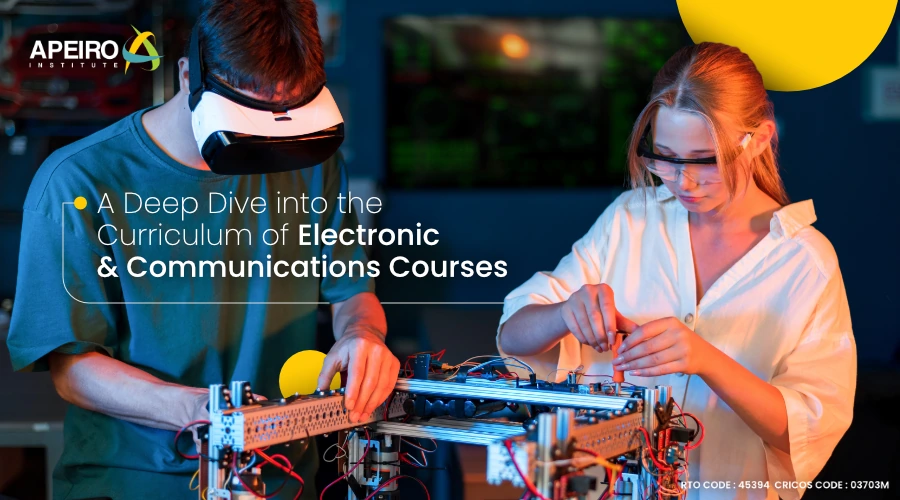In the rapidly evolving landscape of technology, Electronics and Communications Engineering (ECE) stands at the forefront, driving innovation and shaping the future of communication systems, electronic devices, and networks. Pursuing a degree in Electronics & Communications offers a comprehensive understanding of electronic systems, signal processing, telecommunications, and much more. Let’s look closer at the curriculum, certification courses, key features, career opportunities, and other relevant aspects of this field.
Electronics and Communication Courses:
The Electronics & Communications courses curriculum is designed to provide students with a strong foundation in electronics and communication systems. Typically, the coursework includes subjects such as:
Circuit Analysis and Design: This covers the fundamentals of electrical circuits, including analysis techniques, circuit theorems, and design principles.
Digital Electronics: Students learn about digital logic circuits, binary arithmetic, combinational and sequential logic design, and digital system components.
Analog Electronics: This involves the study of analog circuits, semiconductor devices, operational amplifiers, and analog signal processing techniques.
Communication Systems: Topics include modulation techniques, multiplexing, transmission media, digital communication principles, and error control coding.
Signal Processing: Students delve into the theory and applications of signal processing techniques for filtering, compression, feature extraction, and pattern recognition.
Microprocessors and Microcontrollers: This involves learning about the architecture, programming, and interfacing of microprocessors and microcontrollers, which are essential components in electronic systems.
Wireless Communication: With the increasing demand for wireless technologies, this subject covers topics such as cellular networks, satellite communication, and wireless sensor networks.
Electromagnetic Field Theory: Understanding electromagnetic theory is crucial for designing antennas, waveguides, and other communication devices.
Integrated Circuit Design: Students learn about the design, fabrication, and testing of integrated circuits, including CMOS technology and VLSI design methodologies.
Certification Courses for Electronics and Communication Engineering
In addition to academic degrees, various certification courses are available for Electronics & Communications Engineering professionals. Some popular certification programs include:
Cisco Certified Network Associate (CCNA): This certification validates knowledge and skills in networking fundamentals, routing, switching, and security, which are essential for ECE professionals working in the field of networking and telecommunications.
IEEE Certified Wireless Communication Professional (CWCP): CWCP certification demonstrates expertise in wireless communication technologies, including WLAN, Bluetooth, and LTE, and is valuable for professionals specializing in wireless systems.
Certified Electronics Technician (CET): CET certification is suitable for technicians involved in installing, maintaining, and repairing electronic equipment and systems.
Fiber Optic Association (FOA) Certified Fiber Optic Technician (CFOT): This certification is ideal for individuals working with fiber optic communication systems, providing training in installation, testing, and troubleshooting.
Microsoft Certified: Azure Solutions Architect Expert: For ECE professionals interested in cloud computing and IoT applications, this certification validates expertise in designing and implementing solutions on the Microsoft Azure platform.
Key Features of Electronics & Communications Courses
Hands-on Experience: Many programs offer laboratory sessions and projects to provide practical experience in designing and implementing electronic circuits, communication systems, and embedded systems.
Industry-Relevant Curriculum: he curriculum is often updated to reflect the latest technological advancements, ensuring graduates are equipped with the skills employers demand.
Interdisciplinary Approach: Electronics & Communications Engineering intersects with various disciplines such as computer science, physics, and mathematics, offering a diverse learning experience.
Research Opportunities: Students may have the opportunity to participate in research projects and collaborate with faculty members on cutting-edge research in areas such as IoT, 5G networks, and nanoelectronics.
Career Opportunities
A degree in Electronics & Communications opens up various career opportunities in industries such as telecommunications, semiconductor manufacturing, consumer electronics, healthcare, defense, and more. Some common job roles include:
- Electronics Engineer
- Communications Engineer
- Network Engineer
- Signal Processing Engineer
- Embedded Systems Engineer
- RF Engineer
- Telecommunications Consultant
- Systems Analyst
- Technical Sales Engineer
With the proliferation of IoT devices, the rollout of 5G networks, and the ongoing digital transformation across industries, the demand for skilled Electronics & Communications professionals is expected to remain strong in the foreseeable future.
Conclusion
An Electronics & Communications Engineering degree offers a pathway to a dynamic and rewarding career in a technology-driven world. With a robust curriculum, diverse career opportunities, and avenues for specialization through certification courses, ECE graduates are well-positioned to make significant contributions to the advancement of society through innovation and technology.






